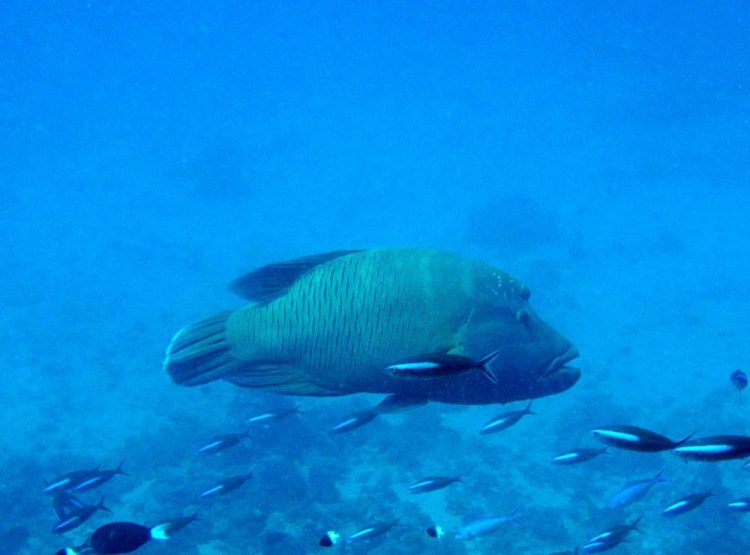Saving coral reefs depends more on protecting fish than safeguarding locations

A humphead wrasse off the coast of East Africa is shown. A new study by WCS has found fish biomass to be of greater importance than geographical location and other factors in determining the species richness of coral reef systems. Credit: Tim McClanahan/WCS
A new study by WCS (Wildlife Conservation Society) has found that coral reef diversity 'hotspots' in the southwestern Indian Ocean rely more on the biomass of fish than where they are located, a conclusion that has major implications for management decisions to protect coral reef ecosystems.
Using data gathered over a 12-year period from nearly 270 coral reefs across the southwestern Indian Ocean, the WCS study found that the highest conservation priorities in the region should be reef systems where fish biomass exceeds 600 kilograms per hectare. This finding conflicts with a common conservation and management policy that emphasizes the geographical location and physical factors that are often associated with reef diversity.
The study–authored by Dr. Tim McClanahan of WCS (Wildlife Conservation Society)–appears in the latest edition of the Journal of Biogeography.
Click here for a link to the study: http://onlinelibrary.
“While geography has often been the main factor that conservation policy has used to establish protected areas, this study shows that protecting fish biomass should be the priority and this can be done with improved fisheries management,” said McClanahan, a Senior Conservationist for WCS. “A hotspot is not a permanent feature and can be lost if the fish and the habitat are not protected.”
Experts agree that fishing is a primary cause in the degradation of coral reefs, and needs to be better managed but what is more controversial is the various roles of protected areas or fisheries restrictions. Protecting regions containing threatened biodiversity–considered to largely be an attribute of geography– has created a policy focus on the geographic hotspots. McClanahan found that the hotspot in the Indian Ocean is a real feature but is maintained more by fish biomass and habitat than by the geographic location. This means that fish biomass and habitat are the most influential factors and should be used to guide management decisions rather than location.
McClanahan's study of 266 sites in seven countries of the southwestern Indian Ocean measured numbers of fish species while simultaneously collecting information on the abundance of corals and algae, depth, geographical location, and the types of fisheries management. This allowed him to compare the importance of each of these factors.
The results support previous studies identifying the Mozambique Channel as a center of species richness in the southwestern Indian Ocean. However, sites in this region with low fish biomass also lacked full diversity, and being in this hotspot center alone did not ensure high diversity. Stronger correlations were found between biomass and local factors such as restrictions on fishing along with coral cover and water depth. The latitude and longitude were significant but found to contribute the least to the variation in numbers of species – a finding that challenges common conservation wisdom.
The study also reveals that protected areas that lacked regular and strong enforcement of fishing bans – classified as 'low compliance' fisheries closures – had nearly as low numbers of fish species as reefs that were regularly fished. The low compliance category included 50 of the 104 reefs included in the study. McClanahan added: “Having fishing restrictions is better than closing reefs to fishing if the closure rules are not followed, which was common and found for nearly half of the studied closures.”
“The Southwest Indian Ocean is a globally important marine biodiversity hotspot. Unfortunately, this study shows that many protected areas are not doing a good job at protecting fish diversity, a shortcoming that threatens some of the world's most important coral reefs,” said Dr. Caleb McClennen, Executive Director of the Marine Program. “While these ecosystems are complex, it is clear we need to do at a minimum two things very well to save the world's coral reefs: strictly enforce established marine protected areas, and; outside these areas, increase the sustainability of fishing practices to increase biomass.”
###
The projects that lead to the compilation of the large data set were supported by the John D. and Catherine T. MacArthur Foundation, The Tiffany & Co. Foundation, and the Western Indian Ocean Marine Science Association (WIOMSA).
Media Contact
All latest news from the category: Ecology, The Environment and Conservation
This complex theme deals primarily with interactions between organisms and the environmental factors that impact them, but to a greater extent between individual inanimate environmental factors.
innovations-report offers informative reports and articles on topics such as climate protection, landscape conservation, ecological systems, wildlife and nature parks and ecosystem efficiency and balance.
Newest articles

Scientists transform blood into regenerative materials
… paving the way for personalized, blood-based, 3D-printed implants. Scientists have created a new ‘biocooperative’ material based on blood, which has shown to successfully repair bones, paving the way for…

A new experimental infection model in flies
…offers a fast and cost-effective way to test drugs. Researchers at the Germans Trias i Pujol Research Institute and Hospital have reinforced their leading role in infectious disease research by…

Material developed with novel stretching properties
KIT researchers produce metamaterial with different extension and compression properties than conventional materials. With this material, the working group headed by Professor Martin Wegener at KIT’s Institute of Applied Physics…



